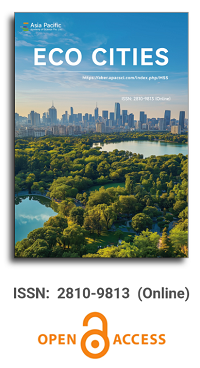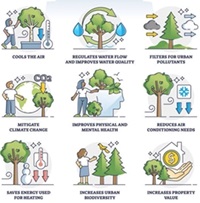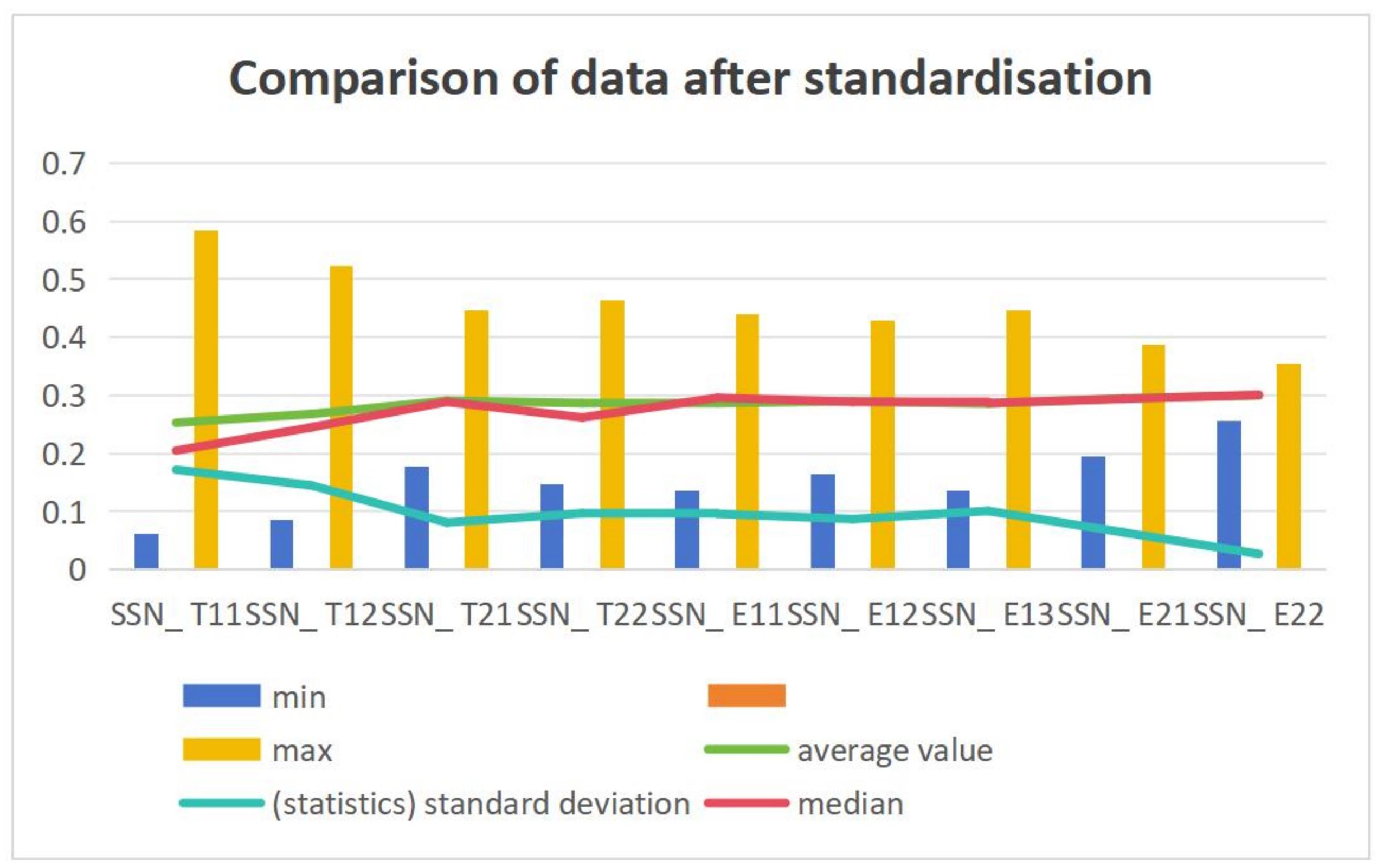
Publication Frequency
Semi-annual
Journal Articles
Search
Search scope
Volume Arrangement
Featured Articles

The exacerbation of climate change impacts within metropolitan areas is a well-documented phenomenon, often leading to severe consequences that pose significant risks to human populations. The impact of urban vegetation and planting design on these factors can be observed. However, it is worth mentioning that while there is an extensive body of literature on the consequences of climate change, there is a relatively small number of studies specifically focused on examining the role of vegetation as a mitigating factor in urban environments. This review paper aims to critically examine existing studies pertaining to the role of urban vegetation in mitigating the detrimental effects of the urban environment. The objective is to offer practical recommendations that can be implemented by city planners. By conducting a comprehensive examination of the literature available in Scopus, Web of Science, and Google Scholar, employing specific keywords pertaining to urban vegetation and climate change, we have identified five prominent concerns pertaining to the urban environment. These concerns encompass particulate matter, gaseous pollution, noise pollution, water runoff, and the urban heat island effect. The present analysis highlights that the impact of urban vegetation on the negative consequences of climate change cannot be unequivocally classified as either positive or negative. This is due to the fact that the influence of urban greenery is intricately connected to factors such as the arrangement, makeup, and dispersion of vegetation, as well as the specific management criteria employed. Hence, this research has the potential to enhance comprehension of the multifaceted nature of urban green spaces and establish a solid groundwork for subsequent investigations.

Tourism has been instrumental in fostering regional economic growth, enhancing the quality of life of residents, and boosting the image of urban areas in Shaanxi, thanks to the accelerated economic and social development of recent years. Nevertheless, the issue of aligning urban development and tourism in terms of space, resources, and the industrial chain remains a significant concern. This paper establishes an evaluation index system for tourism and urban development in the Shaanxi region from 2009 to 2019. It then employs the systematic coupling coordination model to conduct a comprehensive analysis of the coupling coordination degree of tourism and urban development in the region, as well as its various influencing factors. The study demonstrates that the coupling and coordination degree of tourism and urban development in the Shaanxi region exhibited a trend of continuous improvement from 2009 to 2019. The region underwent three stages of development: “uncoordinated development (2009–2011), transformation development (2012–2016), and coordinated development (2017–2019).” The coupling coordination level was elevated from “mild dissonance” to “intermediate coordination” in 2019. In contrast, the tourism economic development of Shaanxi cities remains unequal, as evidenced by the existence of two distinct categories of development: the “lagging tourism economy” and the “coordinated tourism economy.” The findings of this investigation indicate that the general trend of urban development and tourism in Shaanxi is favorable; however, the disparities in the progress of the tourism economy among cities necessitate additional regional coordination and cooperation. The theoretical support for the relevant research and a reference basis for tourism development planning and urban policy making are provided by the evaluation index system and the systematic coupling coordination model proposed in this paper. This will facilitate the sustainable and coordinated development of the tourism industry and cities in Shaanxi.
Urban political ecology of wetland resources in Bamenda town, north west region, Cameroon
Article ID: 2736
Vol 5, Issue 2, 2024
DOI: https://doi.org/10.54517/ec.v5i2.2736
Vol 5, Issue 2, 2024
Received: 21 May 2024; Accepted: 11 June 2024; Available online: 1 July 2024; Issue release: 30 December 2024
Download PDF
Abstract
Wetlands are unique ecosystems that play a critical role in the preservation of biodiversity and the provision of ecological services. This work on the Urban Political Ecology (UPE) of wetland resources in Bamenda has as objective to examine stakeholder participation and power relations resulting from the exploitation and management of wetlands. It looks at the challenges of wetland conservation in context of rapid urbanization. Using a mixed methods approach and the specific case of Bamenda III municipality, data was collected from secondary and primary sources. A household questionnaire survey was conducted with 150 households while 12 in-depth interviews were carried out with key informants. Data was analyzed quantitatively and qualitative and results were critiqued using the lens of UPE. Results show that between 1988 and 2022, wetlands reduction was more than 6.78%. This reduction is caused by agriculture, land reclamation and expansion of urban infrastructure. As such, Conservation has become a huge challenge due to overlapping responsibilities and an ambiguous regulatory system that focuses on biodiversity conservation only. This has created conflictual power relations and a complexified management system. The UPE approach has revealed that the consideration of socio-economic and cultural ecosystem services in wetland management is key to sustainability.
Keywords
urban political ecology; wetland resources; power relations; resource management; Bamenda; Cameroon
References
- Junk WJ, Piedade MTF, Lourival R, et al. Brazilian wetlands: their definition, delineation, and classification for research, sustainable management, and protection. Aquatic Conservation: Marine and Freshwater Ecosystems. 2013; 24(1): 5-22. doi: 10.1002/aqc.2386
- Erwin KL. Wetlands and global climate change: the role of wetland restoration in a changing world. Wetlands Ecology and Management. 2008; 17(1): 71-84. doi: 10.1007/s11273-008-9119-1
- Matthews G. The Ramsar Convention on Wetlands: its History and Development. Ramsar Convention Bureau; 2013.
- Swyngedouw E, Heynen NC. Urban Political Ecology, Justice and the Politics of Scale. Antipode. 2003; 35(5): 898-918. doi: 10.1111/j.1467-8330.2003.00364.x
- Shahjahan ATM, Ahmed KS, Said IB. Study on Riparian Shading Envelope for Wetlands to Create Desirable Urban Bioclimates. Atmosphere. 2020; 11(12): 1348. doi: 10.3390/atmos11121348
- Mbanga L, Dingha C. Wetland Dynamics, Trends and Environmental Implications: Comparative Study in Bamenda II and III Municipalities, North West Region, Cameroon, Coğrafya Dergisi. Journal of Geography. 2022; 45: 1-14. doi: 10.26650/JGEOG2022-980928
- United Nations Organization. World population projected to reach 9.8 billion in 2050, and 11.2 billion in 2100, Department of Economic and Social Affairs; 2018.
- Véron R. Small Cities, Neoliberal Governance and Sustainable Development in the Global South: A Conceptual Framework and Research Agenda. Sustainability. 2010; 2(9): 2833-2848. doi: 10.3390/su2092833
- Alikhani S, Nummi P, Ojala A. Urban Wetlands: A Review on Ecological and Cultural Values. Water. 2021; 13(22): 3301. doi: 10.3390/w13223301
- Balgah S, Kimengsi J. Land Use Dynamics and Wetland Management in Bamenda: Urban Development Policy Implications. Journal of Sustainable Development. 2016. doi: 10.5539/jsd.v9n5p141
- Missaka H, Tiffany H, McAlpine C. Power, politics and policy in the appropriation of urban wetlands: The critical case of Sri Lanka. The Journal of Peasant Studies. 2017. doi: 10.1080/03066150.2017.1393801
- Ngwenwie R. Wetland resource exploitation and its contribution to sustainable livelihoods: case study of Bamenda III sub-division, North West Region of Cameroon [Master’s thesis]. Pan African Institute for Development West Africa (PAID-WA) Buea; 2017.
- Huque S, Pattanaik S, Parthasarathy D. Cityscape Transformation and the Temporal Metamorphosis of East Kolkata Wetlands: A Political Ecology Perspective. Sociological Bulletin. 2020; 69(1): 95-112. doi: 10.1177/0038022919899020
- Kongnso EM, Yemmafouo A, Moumbe JS, et al. Of Practices and (Micro) politics: Challenges of Organic Waste Segregation in Dschang, Cameroon. The Journal of Environment & Development. 2024. doi: 10.1177/10704965241246708
- Yemele O, Mbezele Y, Gordon N. Stakeholder perceptions of wetlands management effectiveness in Cameroon. Journal of Ecology and The Natural Environment. 2023. doi: 10.5897/JENE2023.0959
- Tume JP. Impact of Climate Change on Domestic Water Accessibility in Bamenda III Sub-Division, North West Region, Cameroon. Journal of the Cameroon Academy of Sciences. 2021. doi: 10.4314/jcas.v17i2.4
- Campion B, Owusu-Boateng G. The Political Ecology of Wetlands in Kumasi, Ghana. International Journal of Environment and Bioenergy. 2013.
- Cornea NL, Véron R, Zimmer A. Everyday governance and urban environments: Towards a more interdisciplinary urban political ecology. Geography Compass. 2017; 11(4). doi: 10.1111/gec3.12310
- Wittmer J. Dirty work in the clean city: An embodied Urban Political Ecology of women informal recyclers’ work in the ‘clean city.’ Environment and Planning E: Nature and Space. 2022; 6(2): 1343-1365. doi: 10.1177/25148486221102374
- Coelho K. Reading History and Power in Urban Landscapes: The Lens of Urban Political Ecology. Ecology, Economy and Society–the INSEE Journal. 2018; 1(2). doi: 10.37773/ees.v1i2.33
- Tabe N. Enhancing the enabling environment for illegal bushmeat exploitation in cameroon’s wetlands for consumption and commercialisation: Causes, shortcomings of the law and effects to man and the environment. Asian Journal of Multidisciplinary Research & Review (AJMRR). 2021.
- Huque S, Pattanaik S, Parthasarathy D. Cityscape Transformation and the Temporal Metamorphosis of East Kolkata Wetlands: A Political Ecology Perspective. Sociological Bulletin. 2020; 69(1): 95-112. doi: 10.1177/0038022919899020
- Pietta A, Tononi M. Re-Naturing the City: Linking Urban Political Ecology and Cultural Ecosystem Services. Sustainability. 2021; 13(4): 1786. doi: 10.3390/su13041786
- Kongnso EM, Yemmafouo A, Moumbe JS, et al. Of Practices and (Micro) politics: Challenges of Organic Waste Segregation in Dschang, Cameroon. The Journal of Environment & Development. 2024. doi: 10.1177/10704965241246708
- Kooy M, Walter CT. Towards a Situated Urban Political Ecology Analysis of Packaged Drinking Water Supply. Water. 2019; 11(2): 225. doi: 10.3390/w11020225
- Njeru J. The urban political ecology of plastic bag waste problem in Nairobi, Kenya. Geoforum. 2006; 37(6): 1046-1058. doi: 10.1016/j.geoforum.2006.03.003
- Mallick PH, Chakraborty SK. Forest, wetland and biodiversity: Revealing multi-faceted ecological services from ecorestoration of a degraded tropical landscape. Ecohydrology & Hydrobiology. 2018; 18(3): 278-296. doi: 10.1016/j.ecohyd.2018.04.002
- Shahjahan ATM, Ahmed KS, Said IB. Study on Riparian Shading Envelope for Wetlands to Create Desirable Urban Bioclimates. Atmosphere. 2020; 11(12): 1348. doi: 10.3390/atmos11121348
- Azinwie AG, Yerima BPK, Tening AS, et al. Food Security and Environmental Implications of Urban Wetlands Utilisation as Vegetable Gardens: The Case of Bamenda Municipality Cameroon. Journal of Agriculture and Environmental Sciences. 2017. doi: 10.15640/jaes.v6n1a7
- Kimengsi JN, Nguh BS, Nafoin AS. Peri-Urban Land Use Dynamics and Development Implications in the Bamenda III Municipality of Cameroon. Sustainability in Environment. 2017; 2(3): 273. doi: 10.22158/se.v2n3p273
- Kometa SS, Kimengsi JN, Petiangma DM. Urban Development and its Implications on Wetland Ecosystem Services in Ndop, Cameroon. Environmental Management and Sustainable Development. 2017; 7(1): 21. doi: 10.5296/emsd.v7i1.12141
- Ngwitoh Tanwie C, Fondo Ambebe T, Anjah Mendi G. An Assessment of the Biodiversity Status of Wetland Woody Flora in Bamenda III Sub Division, North West Region, Cameroon. International Journal of Forestry and Horticulture. 2024; 10(1): 1-7. doi: 10.20431/2454-9487.1001001
- Ramsar Convention Secretariat Work Plan. Convention on wetlands (Ramsar, Iran, 1971). In: Proceedings of the 34th Meeting of the Standing Committee Gland, Switzerland.
Supporting Agencies
Copyright (c) 2024 Moye Eric Kongnso, Tiomo Donfack Emmanuel, Nwinifor Kawah Awah
License URL: https://creativecommons.org/licenses/by/4.0/

This site is licensed under a Creative Commons Attribution 4.0 International License (CC BY 4.0).
Editor-in-Chief

Chinese Academy of Sciences, China
Indexing & Archiving
News & Announcements
2024-08-08
Meet our new EBMs!
The journal is pleased to welcome a new team of editorial board members dedicated to collaborating in order to elevate the journal's quality and prominence.
2024-07-11
Eco-cities are becoming a reality!
In the context of eco-city development, the term "eco-city" encompasses a multifaceted ecosystem characterized by the interdependence of natural, social, and economic systems. This concept emphasizes the need for sustainability through environmental friendliness, social equity, and economic growth. Various models of eco-cities, including garden cities, green cities, and landscape cities, reflect the ongoing exploration of achieving harmony between humans and nature in urban living environments.
Member Application
Journal Center
Asia Pacific Academy of Science Pte. Ltd. (APACSCI) specializes in international journal publishing. APACSCI adopts the open access publishing model and provides an important communication bridge for academic groups whose interest fields include engineering, technology, medicine, computer, mathematics, agriculture and forestry, and environment.



.jpg)

.jpg)



